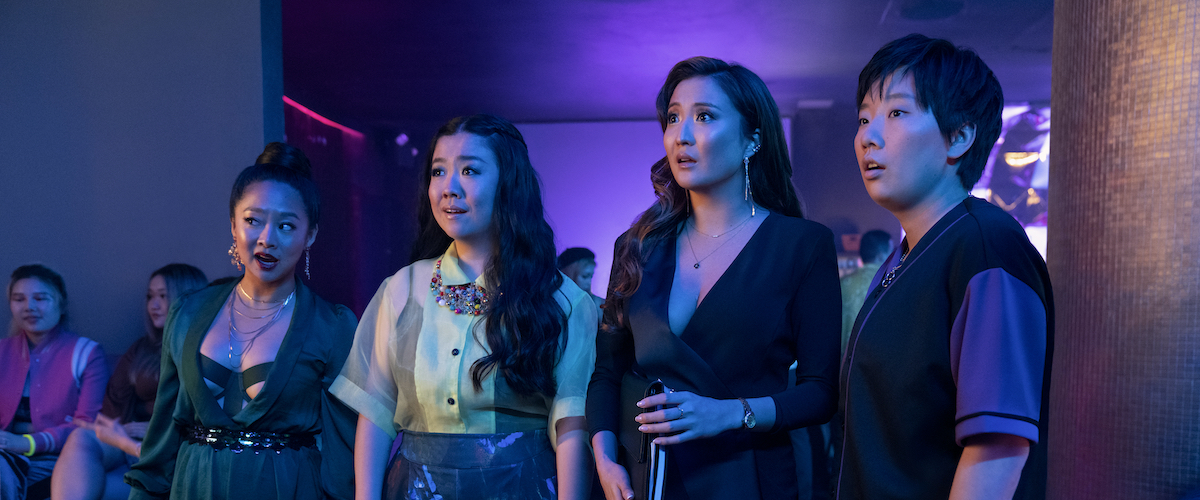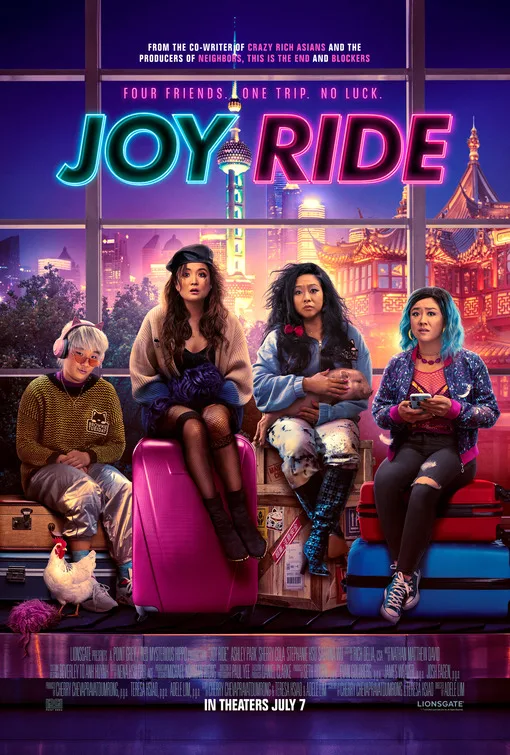Almost as soon as they met as children, Audrey and Lolo became inseparable. They were among the few Asian Americans in a painfully homogeneous white town in the Pacific Northwest. When their first playground bully hurled a racist insult at them, Lolo landed a punch right in his face as Audrey looked on in awe. Since that fateful day, the pair stuck by each other through the rest of school, the start of their careers, and the beginnings of many bad choices. Now as an ambitious associate at a law firm, Audrey (Ashley Park) has the chance for a life-changing promotion when her boss sends her to China to close a major business deal, and Lolo (Sherry Cola), Audrey’s much more chaotic counterpart, comes along on the adventure as a translator back to their homeland. With the help of two more friends, Deadeye (Sabrina Wu) and Kat (Stephanie Hsu), the group makes it an unforgettable trip that gets dirty and deep on what identity means and how to be true to oneself.
Making her feature debut, Adele Lim takes bold risks in her raunchy road trip comedy “Joy Ride.” The movie walks a fine line between exploring heartfelt questions about belonging and outrageous jokes played for shock value. It’s as if Lim and fellow co-writers Cherry Chevapravatdumrong and Teresa Hsiao saw the antics in Malcolm D. Lee’s “Girls Trip” as a challenge to top. It’s safe to say the crew in “Joy Ride” do top the outrageous factor, but whether or not it’s as effective will depend on the viewer’s stomach for bawdy humor.
Still, as uneven as the tone may wobble from Audrey’s search for her long lost mother, who gave her up for adoption, and the group hooking up with members of a traveling basketball team, there’s no shortage of jokes and other comical situations to keep the awkward laughs and full-body cringes rolling along. To enhance the movie’s whirlwind melee, Paul Yee’s cinematography transports audiences from the banality of Audrey and Lolo’s hometown to the luridly colorful animated sequences of the group’s K-Pop fantasy number and the many stops along the way, from misty country roads and expansive rivers to busy cafes and dimly lit clubs. The richness of each scene steadies the sense of whiplash from the story’s breakneck pace.
Beyond crude humor, “Joy Ride” also pokes fun at Audrey’s identity crisis, using it as a springboard for pointed self-criticism and sharp cultural commentary. One of the movie’s sharpest sequences occurs when Audrey is fooled by a white American, a drug dealer desperate to hide her goods. She initially trusts her fellow American at the expense of sitting with other Chinese passengers and puts the group in an even more precarious situation because, as Lolo puts it, Audrey is prejudiced against people who look like her. There are many little introspective moments throughout the movie, like when they land at the Shanghai airport; Audrey notes what a different feeling it is for her to no longer be in the minority. There are even more observational jokes about missing out on a country’s traditional cuisine or speaking the language when you grew up outside the culture. These one-liners and observations throughout “Joy Ride” give a more nuanced sense of humor to the quips about random sex acts and ill-advised tattoos.
As with many an ensemble movie, the strength is in its cast, and “Joy Ride” is no exception. Led by the central drama between Ashley Park and Sherry Cola’s characters, their relationship shifts and evolves throughout the journey, forcing them to reckon with their moments of self-discovery. Park plays the pitch-perfect straight character, the high achiever destined for greatness—with all the flaws that can come with that personality. With a deceptively calm demeanor, Cola’s character often instigates many of the movie’s problems but not in a malicious way, almost as if eternally optimistic that she will get the results she wants. Sabrina Wu’s Deadeye and Stephanie Hsu’s Kat bring even more volatility to the mix, as Deadeye’s unpredictability and deadpan expression make it tough for others to connect with her, and Kat’s sordid past comes to haunt her more than once, even as she’s trying to change her lifestyle for a Christian fiancé.
While not everything in “Joy Ride” comes together smoothly, Lim’s movie is plenty of messy fun. It’s mostly lighthearted but occasionally profound in what it says about identity and friendships. The stars of the show embrace the outrageous high jinks, enjoying the free pass to behave badly and push the envelope of raunch comedy. For all its twists and tangents, “Joy Ride” remains unapologetically true to itself and the central friendship that starts us all on our merry misadventure.
Now playing in theaters.




















